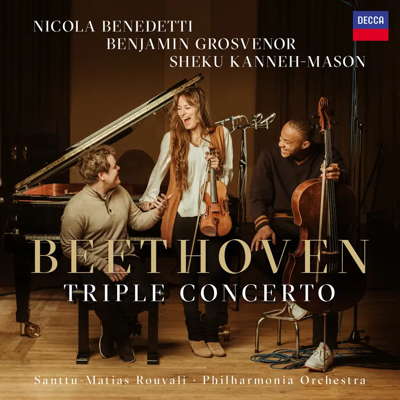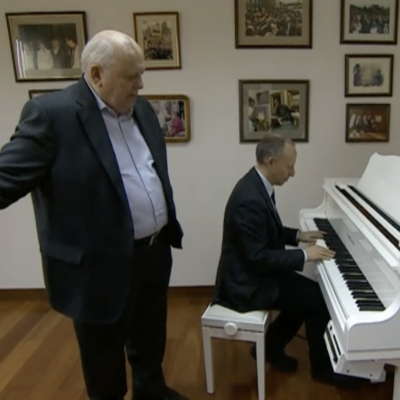 DISCUSSION: What is a work? John Dante Prevedini leads a discussion about The performing artist as co-creator, including contributions from Halida Dinova, Yekaterina Lebedeva, Béla Hartmann, David Arditti and Stephen Francis Vasta.
DISCUSSION: What is a work? John Dante Prevedini leads a discussion about The performing artist as co-creator, including contributions from Halida Dinova, Yekaterina Lebedeva, Béla Hartmann, David Arditti and Stephen Francis Vasta.
MUSIC ON THE FRONT LINE

PETER KING discusses the special place that music has for journalists at the sharp end of conflict zones
Beauty and brutality seem odd bedfellows. For correspondents on the front line, however, music can provide an essential release, even if it has no power to make sense of the horror that is unfolding.
Television journalists paid to witness man's inhumanity to man have been known to turn to their battered Walkmans to listen to cassettes in the lulls between the storms. One such is broadcaster John Suchet, who was unaware that Beethoven had composed a triple concerto until discovering a recording in a shop in Beirut during his coverage of the Lebanese civil war as an ITN reporter in the 1980s. In a voice note for BBC Radio 3's Record Review of the Century transmitted in April 2025, Suchet revealed that when he loaded the tape into the machine back in his hotel room and played the music he hardly breathed for the next thirty minutes.
In his introduction to a new recording of the third movement of the Triple Concerto in C major by three soloists regarded as among the brightest young stars on the classical music scene - Nicola Benedetti (violin), Sheku Kanneh-Mason (cello) and Benjamin Grosvenor (piano) - the veteran broadcaster described this version as the German giant's triple concerto for all time.

Nicola Benedetti, Benjamin Grosvenor and Sheku Kanneh-Mason's
2025 recording of Beethoven's Triple Concerto.
© 2025 Universal Music Operations Ltd
The BBC international editor, Jeremy Bowen, sketched in the back story to his choice of Rachmaninov's Piano Concerto No 2 on Desert Island Discs in 2023. Filing reports early in his career from Lockerbie, the scene of the United Kingdom's deadliest terrorist attack, he had an office in an upstairs room of one of the pubs in the town. In a corner there was an old piano and one of his colleagues played the refrain a stone's throw from the carnage.
One of Bowen's choices for the desert island was Denn alles Fleisch, es ist wie Gras, by Brahms, which awoke memories of Baghdad during the Gulf War in 1991. The cameraman, Rory Peck, 'had a knackered old cassette player with about three home-recorded tapes'. They were trying to cook something on a 'horrible' Primus stove as the bombing was going on outside. The windows were shaking and they could see the tracer - and they would play this music.
Almost forty years earlier, Sir Don McCullin, the photojournalist, told Roy Plomley on the same programme about the loneliness of the dark room, a scene captured by Carol Ann Duffy in her poem, War Photographer: 'In his dark room he is finally alone/with spools of suffering set out in ordered rows'. Explaining his choice of Samuel Barber's Adagio for Strings he said that when he played this music and printed his pictures it made him believe in what he was doing.
And when McCullin was talking to Clive Myrie in April 2025 on BBC Radio 3's Music Matters, Music on the Front Line, the host explained that J S Bach had accompanied him on many assignments: Afghanistan, Iraq and so on. 'His cello suites, you know, they're something that helped me get through all this horrible stuff', said Myrie.
The following week he explained that his latest guest, the BBC Russia editor, Steve Rosenberg, was operating on another kind of frontline: the frontier between fact and fiction that is reporting from Russia. 'As a British journalist, you're very much public enemy number one now', Rosenberg told Kate Mossman in an interview with The New Statesman in April 2025, who observed that he was 'dancing a delicate dance'.
Mossman wrote: 'His questions to Putin - calm, reasonable and delivered in fluent Russian - unroll in a manner that can make the heart race.' Rosenberg is quoted in the article as saying: 'There's no point in being here unless I say what I think is happening in as calm and honest a way as I can'.
The man whose daily trade is to tread a fine line as he rides the Russian tiger - fearlessly putting tough questions to a totalitarian leader in his own backyard, as Myrie puts it - is not only the last BBC man left standing in Moscow. He is also an accomplished pianist - and one of the tracks on the show was a composition by him for a newspaper seller at a local Moscow kiosk he patronized regularly, Valentina, after she was diagnosed with cancer. The song, written to cheer her up, was dedicated to his favourite newspaper vendor in Russia.
There is even a BBC clip, Duetting with Mikhail Gorbachev, showing Rosenberg picking out Russian tunes on a white grand piano for the great man, when the former Soviet president asked the correspondent to play after an interview in 2013. Rosenberg stepped up to the plate, beginning with Moscow Nights, and Gorbachev started to sing. This was followed by Dark is the Night and The Misty Morning, a favourite of the ex-president's late, wife, Raisa. This jam session was living proof that it was possible to be a Soviet leader - and a human being - as well as a correspondent with more than one string to his bow.

Steve Rosenberg duetting with Mikhail Gorbachev.
Photo © 2013 BBC
During the show Rosenberg acknowledged his own debt to the comfort offered by music: 'I don't think I could do what I do now without music, without being able to listen to music, without playing music.' It enabled him to drift off into another world, a nicer world and put behind him all the crazy things that were happening in the real world.
He added: 'In my life, you know, I call it the holy trinity. It's my wife, my dog and my piano ... and for me these three things really help me get through life.'
One of Rosenberg's chosen tracks for the programme, a twentieth century folk-style song with its plaintive violin melody - whose composers were murdered at the hands of Stalin - takes him back to the brutality he witnessed in Belarus. He said: 'The protestors were singing this beautiful song, Kupalinka, and whenever I hear that song I think back to 2020 and to the protests that were being put down so brutally.'
Another choice, Melodiya, by Ukrainian composer Myroslav Skoryk, is a piece that Rosenberg fell in love with, evoking for him the symbolic chestnut trees in Kyiv and speaking volumes about the country and its people. He said: 'This music sums up the beauty of Ukraine, the sadness of what's happening. There's melancholy there, but also the determination of the country to survive as a country, as a sovereign country.'
All these brave voices from the front line serve as a poignant reminder that music can shine a light in the darkest corners - even when brutes in authority, unchecked, seem to get away with murder. Music has proved a powerful counter to madness, a force for civilization against savagery in the eternal fight of truth against the lies of terror, sustaining the eyewitnesses who - given free and unfettered access to the front lines - risk their lives on our behalf. Their truth, we hope, can dare to make tyranny tremble in its jackboots.
Copyright © 29 April 2025
Peter King,
Cambridgeshire UK



